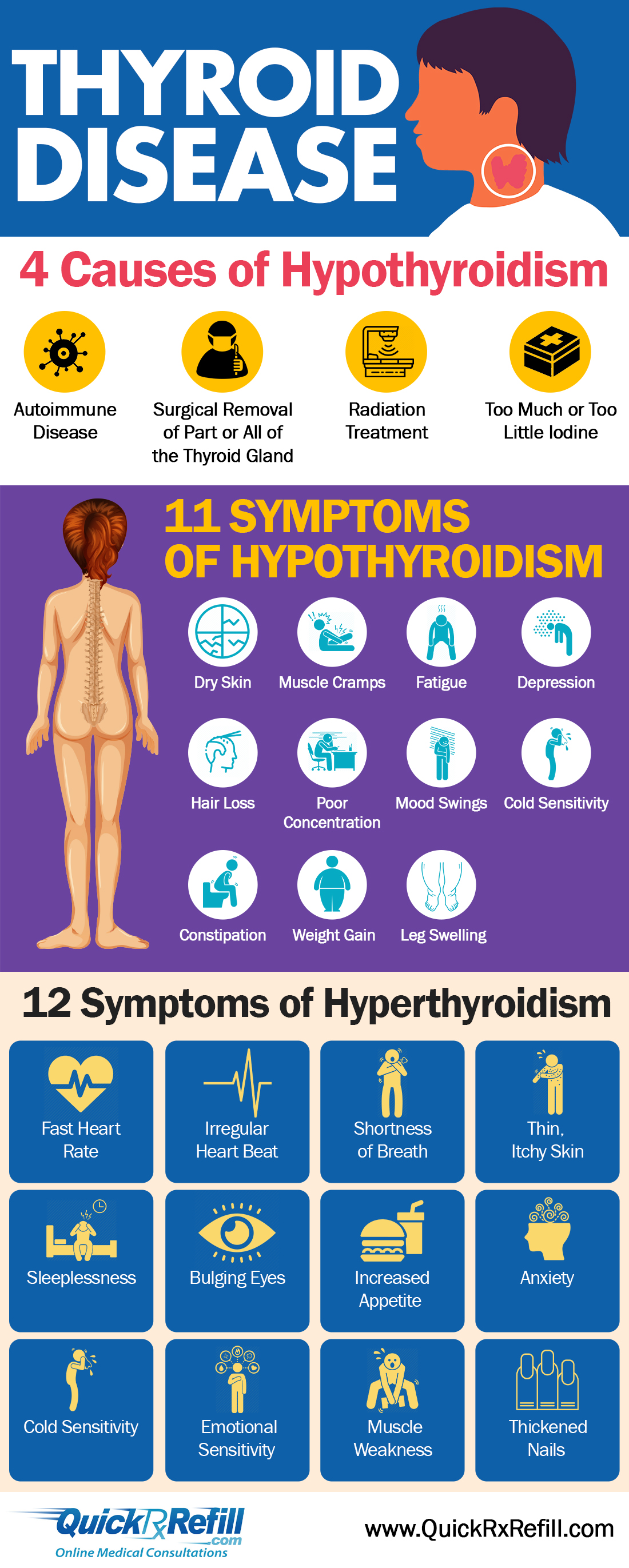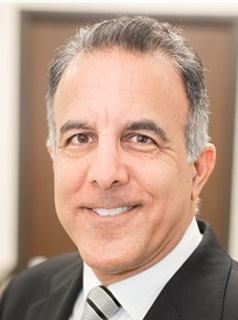Thyroid Disease: Assessment and Management
Thyroid disorders are prevalent, with as many as one in 20 people who have them. Across the U.S., there are approximately 30-million cases of thyroid conditions. The standard treatment for hypothyroidism involves the daily use of a synthetic thyroid hormone.
With this being the case, it is fortunate that people can access a doctor via telemedicine for thyroid medication today, making management more convenient. If you want to get a thyroid prescription, you can consult with a certified doctor safely and efficiently.
What does the thyroid gland do for us?
The thyroid gland is an endocrine gland shaped like a butterfly and located in the lower front of the neck. The thyroid gland's primary function is to control metabolism, which is how the body uses energy. The gland makes hormones that are chemical messengers, and that tells the body what to do. They help the body use energy, stay warm, and keep the brain, heart, and muscles working.
Get refills of your prescription online for thyroid treatment.
Thyroid conditions can be diagnosed easily with a TSH blood test. Once the dosage is established, it is easy to obtain refills of a thyroid prescription online. Following a consult with an online thyroid doctor, getting a Levothyroxine prescription (synthetic T4) affordably and on your own time is possible.
All people need to do is complete an online questionnaire, and they are contacted by a certified doctor who will collect further medical history details. They will receive a thyroid prescription within minutes of the conversation, making this a quick and efficient way to renew a prescription.

Common thyroid issues
Hypothyroidism (underactive or slow thyroid) is more common in women and whites and most common in older people. When it is underactive, the thyroid gland does not make enough of T4 and T3 to keep the body running normally. Low thyroid hormone levels lead to the slowing down of the metabolism.
Hyperthyroidism (fast thyroid) is less common than hypothyroidism, slightly more common in women and whites, and most common in younger and middle-aged people. The production of too many thyroid hormones makes the metabolism speed up.
The thyroid gland can become enlarged, causing a lump or goiter in the front of the neck. Both an underactive or overactive thyroid can lead to the formation of a goiter.
Whether the thyroid is underactive or overactive, medication can help to restore the balance. Can doctors prescribe Levothyroxine via telemedicine? It is easy to diagnose hyperthyroidism with a TSH blood test. Following a consult with a certified physician online, it is possible to get a Levothyroxine prescription. The Levothyroxine prescription will help to replace the low T4 thyroid hormone.
Key risk factors
Although anyone can develop a thyroid problem, certain factors can increase the risk. Women are at greater risk than men and being over 50 increases risks in both women and men. A family history of thyroid disease also increases the risk.
Taking certain medications, such as amiodarone for the heart, lithium for bipolar disorder, and interferon-alpha or interleukin-2, can affect thyroid hormone production. Smoking and low iodine intake can also affect the production of thyroid hormones.
What causes hypothyroidism?
There may be many reasons why the cells in the thyroid gland cannot make enough thyroid hormone. Here are some of the major causes.
Autoimmune disease: The immune system that protects the body from invading infections can mistake thyroid gland cells and their enzymes for invaders and attack them. This means they are unable to make enough thyroid hormone. A common form of autoimmune thyroiditis is called Hashimoto's thyroiditis.
Surgical removal of part or all of the thyroid gland: Some people have conditions, such as thyroid cancer, where they need to have the whole thyroid removed. If part of the gland is left, it may make enough thyroid hormone to keep blood levels regular, but treatment is necessary if the whole thyroid is removed. In this case, patients can get a prescription for thyroid hormone online.
Radiation treatment: Treatment with radioactive iodine for lymphoma, Hodgkin's disease, or cancers of the head or neck can destroy part of the thyroid function.
Too much or too little iodine: The thyroid gland needs iodine to make thyroid hormone. Iodine is found in foods like iodized salt, milk, and seafood. When iodine levels in the body are too low, this can decrease thyroid hormone production.
High levels of iodine can also cause problems, although the effect is somewhat unpredictable and can lead to hypothyroidism or hyperthyroidism. Keeping thyroid hormone production in balance requires the right amount of iodine.
Symptoms of hypothyroidism
Although thyroid disorders are so common, they can be challenging to diagnose because the symptoms may be mild, and it is easy to confuse them with the symptoms of other conditions.
Some of the symptoms are:
- Dry skin
- Muscle cramps
- Fatigue
- Depression
- Hair loss
- Poor concentration
- Mood swings
- Cold sensitivity
- Constipation
- Weight gain and obesity
- Leg swelling
What causes hyperthyroidism?
One of the most common causes of hyperthyroidism is Graves' disease, which is an autoimmune disease. The immune system creates antibodies that target the thyroid and increase the production of thyroid hormones.
Symptoms of hyperthyroidism
Some of the symptoms are:
- Fast heart rate
- Irregular heartbeat
- Shortness of breath
- Thin, itchy skin
- Sleeplessness
- Bone loss
- "Bulging" eyes
- Greater appetite
- Anxiety
- Cold sensitivity
- Emotional sensitivity
- Muscle weakness
- Thickened nails

How do you know if you have thyroid problems?
The symptoms of thyroid problems are variable and non-specific, which means that a blood test must be taken for diagnosis.
Medical history and physical exam: You will need to see a doctor if you suspect you have a thyroid problem. The doctor will take your medical history and conduct a physical examination.
He or she will check your heart rate, hair quality, skin texture, eyes, and nail texture. If the doctor thinks it is warranted, thyroid tests will be conducted.
Blood lab testing: Thyroid Stimulating Hormone (TSH) stimulates the thyroid to produce thyroid hormones T4 and T3. Testing TSH levels is the most common way to know for sure whether you have a thyroid problem.
When T4 and T3 are low, TSH production increases to stimulate the thyroid to produce more hormones. Raised TSH is commonly seen when the thyroid is underactive, whereas low TSH levels are seen in response to high levels of thyroid hormones when the thyroid is overactive. The body tries to reduce the production of T4 and T3.
The normal TSH range is over 4.2mIU/L, and most doctors will recommend treatment once your TSH is over 10mIU/L as this shows the thyroid is beginning to struggle to produce thyroid hormones.
The T4 test is another simple blood test that measures how much-unattached T4 is in the blood and available to get into the cells. Low levels of T4 may indicate that the thyroid is underactive while high levels suggest that the thyroid is overactive.
Other tests that may be conducted in some instances are:
- An ultrasound
- A scan of the thyroid
- A thyroid fine-needle biopsy (to look at small tissue under a microscope)
Once hypothyroidism has been diagnosed, it can be treated by dosage with a synthetic hormone. Getting an online prescription for thyroid medication can help make treatment convenient once the correct dosage has been established.
Treatment of hypothyroidism
Finding a skilled medical professional, such as an endocrinologist specializing in the thyroid, is essential as a medical treatment for a thyroid condition requires careful monitoring. In almost all patients with underactive thyroids, it is possible to control the disease.
Treatment of hypothyroidism involves replacing the amount of hormone the thyroid can no longer make with synthetic thyroxine pills such as Synthroid, Levoxyl, Levothroid, and Levothyroxin. These pills contain the same kind of hormone the thyroid gland makes and help to bring the TSH and T4 levels back to normal. Most hypothyroid patients can be treated as outpatients and do not have to go into hospital.
A blood test reveals what dosage a patient needs, and once they start taking any medication, they will have regular blood tests to see how well it is working. The doctor will gradually increase the dosage until the lab values are normal. Thyroid Stimulating Hormone (TSH) will be checked six to eight weeks after any medication or dosage change.
If patients experience hyperthyroid systems when treated with replacement therapy for hypothyroidism, low TSH levels will indicate too much thyroid hormone, and the dosage needs to be lowered. It can take a few months to find the right dosage of thyroxine to bring thyroid hormones to a level where the patient feels normal again.
Get a thyroid prescription: The goal of treatment is to get and keep the TSH in the normal range, and multiple changes may be necessary to reach the right level. Once the dosage is settled, patients may only need TSH tests once a year. Settled dosage also means that it is easy to get a prescription for thyroid medication.
Treatment of hyperthyroidism
Radioactive iodine is the most common treatment option for hyperthyroidism, but it may also be treated with medications or surgery. If it is not treated, it can cause an irregular heartbeat or bone loss.
Management of hypothyroidism
Follow directions on thyroid replacement medicines to avoid taking too much or too little. Do not skip doses. Return to your doctor if your symptoms worsen or you want to change your dose or brand. If you gain or lose a lot of weight, your dosage may not be correct.
If you start taking antacids, iron tablets, or calcium supplements, this could interfere with your medication's absorption. Medicines that contain estrogen can also impact dosage, so if you make any changes to medications, this should prompt a re-evaluation of your thyroxine dose.
Once patients take the medication in a dosage that effectively controls the symptoms, an annual thyroid hormone check is sufficient.
If you have not been taking your pills, you need to tell your doctor how many you have missed honestly. You may have missed taking medications because you lost them or were traveling and forgetting them at home. In situations like these, see an online thyroid doctor and get a prescription for Levothyroxine online instead of not taking medication.
Patients should never decide that they are doing well and do not need thyroxine treatment anymore. Rather than just not taking the pills, they should instead ask if the dosage could be lowered. If the TSH goes up, then they know the dosage needs to be increased again.
Lifestyle remedies for thyroid problems
Hypothyroidism needs to get regular exercise to improve their muscle tone, heart function, and energy. Those who experience excessive weight gain must work on improving their diets.
Patients with hyperthyroidism may need to add more calories and protein to their diets, and seek a dietician's help is advisable. For thinning of the bones, those with hyperthyroidism need to get enough calcium to help prevent osteoporosis. Vitamin D must be taken with calcium to aid its absorption.
A final word
With thyroid problems being so common today, it is fortunate that treatment is available to help restore the balance to live normal lives. Untreated hypothyroidism can carry some serious health risks such as the increased risk of heart disease, and once thyroid tissue is damaged, it will not replace itself. Most people with an underactive thyroid require treatment for the rest of their lives. Patients can get a prescription for thyroid problems today that makes treatment convenient and affordable.

WARNING: Limitations of Online Doctor/Medical Consultations and Online Prescriptions, QuickRxRefills Cannot and Will NOT Prescribe, Dispense, or Resell any and all medications Narcotics/Controlled Substances (this policy is fully enforced by the Drug Enforcement Administration (DEA)) for Anti-depressants, Pain, Anxiety, Weightloss, Sleep, ADHD/ADD, Anabolic Steroids, Testosterone Replacement Therapy and any and all Medications that contain GabaPentin or Pseudroephedrine including non-controlled substances or any medications that are considered controversial, Off Labeled (Growth Hormone aka HGH) or recalled in nature such (i.e. Retin-A, Accutane). Furthermore, QuickRxRefills is not a substitute for an office based physician in your location nor is it a substitute for Emergency Medical Care or 911. If you do experience a "true" medical emergency your are encouraged to pick up the phone and dial 911 as soon as possible.






